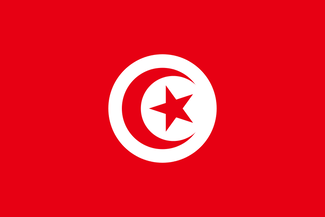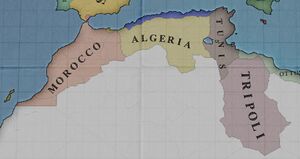| This article may need to be rewritten in part or entirely. Please help us improve this article. |
| 突尼斯 | |
|---|---|
 | |
| 政府类型 | Absolute Monarchy |
| 执政党 | Royal Faction (conservative) |
| 首都 | Tunis |
| 人口 | 347,85 |
| 主体民族 | Maghrebi |
| 被接受民族 | None |
| 识字率 | 3,7% |
| 国家价值观 | Order |
| 科研学派 | Uncivilized |
| 地位 | Uncivilized |
Tunis starts out in one of the most dangerous positions in the world. Bordered by ![]() France and within easy reach of multiple other European nations, it only has a feeble army of three infantry and three irregular brigades to defend itself with. Being an uncivilized state, Tunis tends to be made a protectorate within the first two years of the game, usually by France. Averting that fate is a daunting challenge, but one that can be achieved with perseverance and luck.
France and within easy reach of multiple other European nations, it only has a feeble army of three infantry and three irregular brigades to defend itself with. Being an uncivilized state, Tunis tends to be made a protectorate within the first two years of the game, usually by France. Averting that fate is a daunting challenge, but one that can be achieved with perseverance and luck.
As Tunis is an Arabian nation it is possible to form ![]() Arabia after westernizing.
Arabia after westernizing.
Initial Diplomacy
Tunis has precious few diplomatic points to spare, but ![]() Algeria and
Algeria and ![]() Morocco tend to propose an alliance early on. If the former accepts and the latter are attacked by France, then Tunis can negotiate a white peace, thus securing a five-year truce with its greatest potential threat. Once the five years are up France will still be a threat, but by then one of two new conditions may apply: either France will have conquered enough land in Algiers and/or Morocco to be satiated and will start influencing Tunis in order to place it in its sphere of influence, or Tunis will be at war with another European nation and France will have to wait its turn. The latter is a given, since until Tunis enters a sphere of influence or westernizes, it can expect to be under constant attack by Europeans.
Morocco tend to propose an alliance early on. If the former accepts and the latter are attacked by France, then Tunis can negotiate a white peace, thus securing a five-year truce with its greatest potential threat. Once the five years are up France will still be a threat, but by then one of two new conditions may apply: either France will have conquered enough land in Algiers and/or Morocco to be satiated and will start influencing Tunis in order to place it in its sphere of influence, or Tunis will be at war with another European nation and France will have to wait its turn. The latter is a given, since until Tunis enters a sphere of influence or westernizes, it can expect to be under constant attack by Europeans.
European Invasions
If Tunis is unlucky, the plural form in the title will be accurate. There are four classes of threat to Tunis, early in its game. From mildest to more serious, those are:
- Class I: Nations with no means of power projection to Tunis. War with a Class I threat is beneficial, since it prevents other, more serious threats from emerging. The
 Papal States tend to be that way early in the game, and
Papal States tend to be that way early in the game, and  Sweden can be expected to be a consistent Class I threat for the first twenty years.
Sweden can be expected to be a consistent Class I threat for the first twenty years.
- Class II: Nations with means of blockading Tunis' ports but not of landing an army. Blockades drive up war exhaustion, but such threats are not lethal to Tunis.
 Portugal can be a Class II, depending on circumstances, as can
Portugal can be a Class II, depending on circumstances, as can  Sardinia-Piedmont. Enemy countries that have been Class I threats in the past may have expanded their navies to be Class II in subsequent wars.
Sardinia-Piedmont. Enemy countries that have been Class I threats in the past may have expanded their navies to be Class II in subsequent wars.
- Class III: Nations with the transport capacity to land small armies at Tunis. These are formidable threats and care must be taken that the Tunisian army is well supplied and well led when facing them. If numerical superiority can be maintained, the Europeans can be defeated.
 Two Sicilies and the
Two Sicilies and the  Netherlands are typically Class III.
Netherlands are typically Class III.  Spain can be a Class III if the Tunisian army is significantly expanded by the time they invade.
Spain can be a Class III if the Tunisian army is significantly expanded by the time they invade.
- Class IV: Nations with a strong military and either a land border with Tunis or a large transport capacity. Deadly threats. Any war with a Class IV can be expected to lead to certain defeat. France is the prime example, although Spain may also have the same effect.
If it is not attacked immediately, Tunis may find it profitable to annex Algiers, after the French inevitably leave it with a single state. If Tunis can hold out against the subsequent succession of European invasions for long enough to find safety in a sphere of influence, it can survive and think about prospering.
Beyond Survival
Research
Tunis lacks Freedom of Trade and many other technologies civilized nations take for granted. It also starts out with 3.6% literacy. Philosophy and social thought will greatly help the research rate, while army techs may prove invaluable in defending the country from European troops. With that in mind, it is still possible to research all the technologies required for westernization by the 1860s, leaving prestige and military score as the more difficult conditions. The former can most easily be attained through cultural techs, since Tunis lacks a variety of weak neighbours to use for such ends. For the latter, high military spending will be required, as well as a focus on officers. The population of Tunis is too small to support a large army but a large and healthy officer corps should alleviate that problem. Once the conditions for westernization are met, research rate will go up, giving the country more freedom of movement.
Politics
Tunis starts out as an absolute monarchy with no reforms passed and a highly conservative majority in the upper house. However, enemy blockades and western presences have the effect of gradually raising militancy. Given enough time, it will be high enough for the conservative majority of the upper house to enact political or social reforms, if that is deemed appropriate. Steadily passing reforms can keep the people from rebelling, but the nation will have to deal with their effects, positive or negative, in the future.
Civilized Nation and Beyond
Once westernized, Tunis will be able to industrialize and invade uncivilized lands like any other minor civilized nation. However, it will still be hampered by low literacy, relatively low technology and probably uncompetitive industry. Also, France tends to colonize the regions south of Tunis fairly quickly, so direct colonial expansion is a tricky prospect. But other avenues of expansion can be found by a resourceful government and, if enough health care reforms were passed during the invasion years, the rising population should provide the country with a rapidly increasing pool of craftsmen.
Tunis has, like any other Arabian nation, the possibility to form Arabia. Tunis needs to be a great power and influence at least 1 other Arabian nation.
